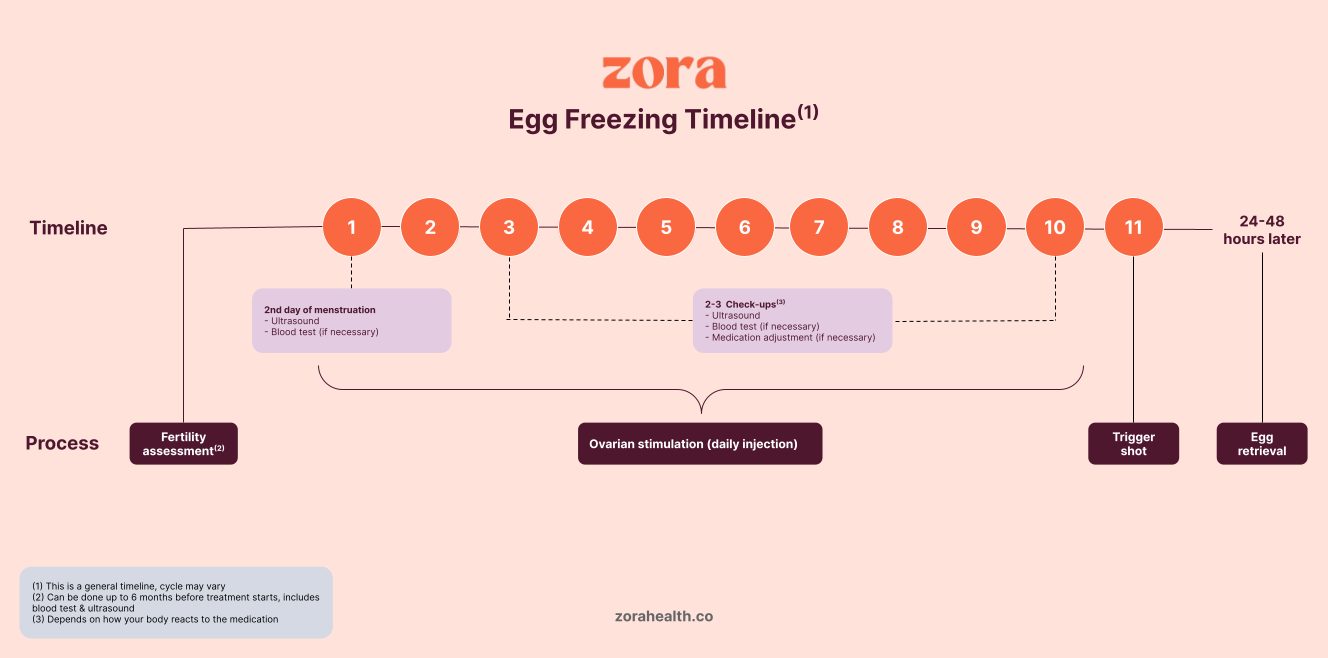Egg Freezing
As you age, both the health and number of your eggs decline significantly. However, by freezing younger and healthier eggs, you can boost the likelihood of a successful pregnancy whenever you’re ready.
We understand that deciding when to start a family is a deeply personal and complex decision. It involves various important factors, whether it’s financial stability or your individual fertility level.
That’s why at Zora Health, we understand why you may choose to freeze your eggs first.
No matter your reason, our compassionate and knowledgeable team is here to provide support and guidance at every step** of the egg freezing process. We believe all individuals who ovulate deserve the opportunity to make the best decision for themselves and their future families.
We have various options available to preserve your fertility, and we’d be delighted to discuss them with you to find the best path forward for your family plans.
Egg freezing may be right for couples & singles who are:
- Delaying starting a family
- Diagnosed with PCOS, endometriosis, or other conditions that can affect fertility
- Undergoing cancer treatments which can damage one’s egg supply (e.g. chemotherapy, radiation, stem cell transplants, etc.)
- Undergoing surgical removal of the fallopian tube, ovary, or uterus
The Zora Difference
- List of questions to ask your specialists
- Expert support
- Care advocate to advise you on global clinic options & what to look out for
Excludes
- Fertility tests
- Initial consultation with specialists for selection
- Preimplantation genetic testing
- Pregnancy monitoring
- Extra medications if low egg reserve but can be added on through Zora Health.
Other add-ons
We work with partners that offer special pricing for the following:
- TCM packages
- Exercise packages
- Massage packages
- Pre-natal yoga
- Meal subscription plans
Just let us know what you are interested in and we will find you the right provider!
$5,800-$20,800* Treatment cost
* Pricing is an estimate. It varies by country, clinic, and final treatment plan determined by your fertility specialist. You may let us know if you have a preferred doctor.
$600-$1,500* Storage cost
*Annual storage cost estimate, varies from clinics, number of eggs and years.
Why work with Zora Health?
- Complimentary expert support throughout your journey
- Care advocate to advise you on global clinic options
- List of questions to ask your specialists
**Zora Health does not provide medical advice or administer treatments. We connect clients with appropriate clinics for relevant care.
Transparent pricing
Other add-ons
We work with partners that offer special pricing for the following:
- TCM packages
- Exercise packages
- Massage packages
- Pre-natal yoga
- Meal subscription plan
Just let us know what you are interested in and we will find you the right provider!
The Full Egg-Freezing Journey
Fertility Assessment
Before your eggs are frozen, you’ll need to test your ovarian reserve (the number of eggs in your ovaries right now) and consult a specialist. This determines whether egg freezing is viable for you.
Once you agree to continue with the egg freezing process, a timeline for starting the cycle will be decided on.
1
(Optional) Birth Control: 2-3 Weeks
Your doctor may recommend using birth control pills first. These pills can help synchronize follicle growth during ovarian stimulation in the next step. It also grants you flexibility in scheduling a date to retrieve your eggs.
With birth control pills, you can select a specific week to retrieve your eggs and work backwards to choose a start date for ovarian stimulation. All in all, this leads to a smoother and more manageable egg freezing cycle.
2
Ovarian Stimulation: 10-12 Days, 2-4 Monitoring Appointments
Once you start your menstrual cycle or stop taking birth control pills, you will begin daily injections of these hormones:
Follicle-stimulating hormone (FSH), and Luteinizing hormone (LH)
These injections are higher doses of natural hormones that replicate what your body produces to mature one egg. The goal is to stimulate the growth and development of multiple eggs, allowing you to freeze more than what your body would naturally produce.
Before you begin hormonal treatments, your care team will provide detailed instructions for administering the medication. Please follow these instructions carefully to ensure the medicine is administered correctly and punctually.
During this time, you’ll be visiting your specialist regularly. These in-person appointments include blood tests and ultrasounds to ensure your follicles are growing properly. The specialist may adjust your medication dosage as well, if it’s necessary.
While the medications are natural hormones, your ovaries may start to enlarge in response to them. This might lead to abdominal discomfort or bloating. Also, the increased estrogen levels may cause heightened PMS symptoms.
3
Egg Retrieval, Ovulation, and Trigger Injection
At the end of the stimulation period, your eggs are ideally mature and ready for retrieval. You'll receive a hormone injection to induce ovulation. This injection helps the eggs to mature and prepares your body for egg retrieval.
After 24-48 hours of receiving the final injection, you will return to the clinic to retrieve your eggs. An anesthesiologist will sedate you to ensure that you are comfortable. Then, the fertility specialists will gently and carefully remove your eggs. This process usually lasts around 15-60 minutes.
After your eggs are retrieved, you can rest comfortably in the recovery room until you’re ready to head home. As you would be under anesthesia for the egg retrieval, we recommend someone to bring you home after the procedure is completed.
This is the only day out of the entire egg freezing process that you’re recommended to take the day off.
4
Egg Vitrification (Freezing the Retrieved Eggs)
After the eggs are retrieved, the embryologists will evaluate them to determine which ones have matured enough to be frozen.
Only mature eggs are selected before being frozen using a technique called vitrification. In egg vitrification, water is removed from the eggs or embryos and replaced with an "antifreeze" solution before rapidly cooling them. It’s a special technique that prevents cells from being damaged during the freezing process, by avoiding the formation of ice crystals.
Finally, your frozen eggs are stored in liquid nitrogen for long-term preservation.
After your eggs are retrieved, you will be notified of the number of eggs that were successfully frozen. Following the retrieval, your period is expected to occur 7-14 days later.
5

As seen in







You deserve the very best.
That's why we’re here to support you — whenever you need it.
1
Personalised Care Navigation
Expert guidance to choose the right care provider and navigate the process, costs, & regulations.
2
Seamless, All-in-One Care
Consultations, diagnostics, telehealth, education, & treatment referrals are available on one platform.
3
Trusted, Reliable Resources
Gain clarity & confidence with verified information. Save time, reduce stress, & eliminate endless research.
FAQs About Egg Freezing
What should I consider if I’d like to freeze my eggs?
When considering egg freezing, there are several important factors to keep in mind.
Firstly, the timing of the procedure is crucial because both eggs and sperm decline in quality and quantity as we age.
That’s why it’s generally recommended to freeze your eggs as early as possible to ensure optimal quality and quantity. While you can freeze your eggs up till the age of 37 years old, it's still recommended to freeze them earlier if possible.
Secondly, if cost isn’t a major concern, freezing your eggs may be a good form of "insurance" as they are frozen at the age at which you go through the process. However, do note that this is not foolproof, and there is much debate about its efficacy.
The type of fertility treatment is another consideration to keep in mind. If you’re looking for fertility preservation, you can opt for either elective egg freezing (for single women) or embryo freezing (for couples). If you are looking to get pregnant, there are various options such as IVF, IUI, and others.
Legalities are also an important factor to consider. What is the legislation governing freezing eggs in Singapore, for example? Additionally, it's important to think about what happens in the future. Some nations or states only allow married couples to use frozen eggs. Furthermore, the age limit for egg freezing may differ by location.
Finally, the logistics must be taken into account. Where do you want to perform the procedure?
If it’s overseas, would you prefer to opt for a hybrid process? To illustrate, undergoing ovarian stimulation in Singapore before retrieving and freezing the eggs in Malaysia.
Alternatively, would you want to spend 2-3 weeks overseas for the entire process? For instance, undergoing ovarian stimulation in Malaysia before retrieving and freezing your eggs in Malaysia as well.
Each option has its own pros and cons, which must be weighed carefully.
What’s the difference between egg freezing & embryo freezing?
What is egg freezing?
Egg freezing (also known as oocyte cryopreservation) is a procedure that involves collecting mature eggs from the ovaries and freezing them for use in the future. Egg freezing offers you the option of fertility preservation.
There are many reasons why people with a vagina want to freeze their eggs. Often, it’s to preserve their fertility so that they can try to have children when they are ready at a later date, while keeping their chances of conceiving as high as possible. This is known as ‘social’ egg freezing.
Women may also choose to freeze their eggs before undergoing a medical treatment that may impact their fertility, such as chemotherapy. When you’re ready to use the frozen eggs, they are defrosted and fertilized, before being transferred to the womb.
What is embryo freezing?
Embryo freezing is a procedure that allows you to store your fertilized eggs for the future. These eggs would’ve been fertilized in a laboratory with either a partner or donor’s sperm.
Generally, when people undergo in-vitro fertilization (IVF) or intracytoplasmic sperm injection (ICSI), quality embryos are left over after the chosen one is transferred. These embryos can be frozen for use in the future, should the initial treatment not work or if you wish to try for another baby.
Others may choose to freeze their embryos to preserve fertility, so they can use them to try to conceive at a later date. This is known as the ‘freeze-all’ or elective frozen embryo transfer (FET) technique.
In certain cases, individuals with specific health conditions that affect their fertility may benefit from having an FET. Sometimes, embryos may also be frozen to be donated to others or for future use in medical research.
What is the main difference between egg freezing and embryo freezing?
The main difference between egg freezing and embryo freezing can be found in the laboratory procedures.
During embryo freezing, eggs are fertilized via IVF. They then develop over several days into embryos before being flash-frozen via vitrification. The health of the embryos, created from young and healthy eggs, is maintained when they’re frozen at such a low temperature without any ice crystals forming.
On the other hand, egg freezing does not involve the egg going through fertilization before being frozen.
Should I go for egg freezing or embryo freezing?
When it comes to these two fertility preservation options, egg freezing (oocyte cryopreservation) is often the more practical and flexible choice for many women.
Freezing embryos requires fertilization with sperm first. This may not be feasible for single women or individuals who aren’t sure about their co-parenting plans yet.
Here are several other factors you should consider before deciding:
Consent and Autonomy
A key difference between egg and embryo freezing is the issue of autonomy.
Eggs can be frozen first without being fertilized. This allows you to preserve your fertility independently and freely decide what to do with your eggs.
With embryo freezing, the fertilized eggs naturally belong to two separate individuals. If you freeze embryos with donor sperm, you may not be able to use them if you find a partner later on and wish to have biological children with them.
Additionally, freezing embryos with your current partner may limit your options down the line if you’re unsure of your family plans. What’s more, it could potentially create legal issues if you disagree with your partner on how to use or dispose of the frozen embryos.
Furthermore, if you used your partner’s or a private donor’s sperm to freeze your embryos, they could withdraw consent for the embryos to be used at any time before they are transferred (this does not apply if you used sperm from a donor bank).
Should your circumstances change (e.g., a break-up happens), you could end up in a situation where you are unable to use the embryos you’ve frozen. This wastes a considerable amount of money, time, and effort.
Conversely, freezing eggs offers you greater autonomy and the ability to delay co-parenting decisions until you're absolutely ready. It's also a simpler path forward in case a break-up or divorce happens.
Lastly, discarding unfertilized eggs is a more straightforward decision than discarding embryos.
Cost
Egg freezing is generally more affordable than embryo freezing since the latter requires IVF before freezing.
Success Rate
Many believe a frozen embryo is more likely to result in a pregnancy than a frozen egg. However, that’s not a fair comparison from a statistical point of view. That’s because several eggs are required to result in one embryo, no matter which method you choose.
You can freeze many eggs, which may be fertilized later to create a few embryos, or you can fertilize them right after retrieval and freeze the few embryos that develop. Either way, you will likely have the same number of potential chances at pregnancy.
When older freezing technology was used, embryos survived the freezing and thawing process better than eggs because they are slightly sturdier. However, the introduction of vitrification has largely eliminated this difference. With the egg vitrification technique, survival rates are similar: Over 90% of eggs and embryos made it through.
All in all, egg freezing is a practical and accessible choice that allows you to preserve your fertility and keep your options for the future open. Remember, you’re the best person to decide whether egg or embryo freezing fits your family plans best!
How many eggs should I freeze?
The number of eggs you should freeze depends on several factors, including your age and ovarian reserve.
On average, it takes approximately two cycles to reach the recommended number of eggs for an optimal chance of pregnancy. Not every frozen egg will result in a pregnancy, but freezing more may increase your success rate.
For individuals who are 37 or younger with a healthy ovarian reserve, you should freeze around 10 to 20 matured eggs for future use. Those over 37 years old or have a diminished ovarian function should freeze approximately 30 eggs in order to have multiple attempts to conceive. Do note that the age limit for egg freezing can differ from country to country.
Your specialist can also provide more precise guidance based on your specific circumstances.
How long can eggs be frozen for?
Eggs can be frozen for many years, with some studies suggesting they remain viable for up to 10 years or more.
What are some of the side effects that I may experience from the egg freezing process?
During Ovarian Stimulation
Skin Changes
Some individuals may experience skin changes due to the hormonal shifts caused by fertility medications. Acne breakouts are the most common skin changes while others may experience dryness and flakiness instead.
Although you can’t predict how your skin will react during the treatment cycle, there are simple steps you can take to prevent or manage such changes. For example, use a gentle and oil-free facial cleanser and moisturizer that suits your skin type before starting any IVF treatment or egg freezing cycle.
Bloating and Constipation
Bloating is a common side effect of ovarian stimulation, which can affect your appetite due to the limited abdominal space occupied by the ovaries and bloating.
Constipation is also typical during fertility treatment and is often associated with elevated progesterone levels. This occurs after ovulation, egg retrieval, and during pregnancy too.
Weight Gain
Weight gain during ovarian stimulation is normal due to stress, hormone fluctuations, and bloating. Although it’s a common side effect, weight gain may still lead to elevated stress. During this time, proactively find ways to manage it.
Headaches
Headaches can also occur during ovarian stimulation, especially if you already frequently experience headaches or migraines. Hormonal changes in the body typically trigger these headaches.
After Egg Retrieval
Soreness
After the egg freezing cycle ends, your menstrual cycle should return to normal. Also, any soreness from the egg retrieval should subside within a few days. You may feel a little pain when you wake up, which is similar to period pains. However, such side effects typically last only a few days after the procedure.
Most women can resume their daily activities, including work, the day after the procedure. However, it’s no harm if you take a few days off to rest.
Ovarian Hyperstimulation Syndrome (OHSS)
In rare cases, Ovarian Hyperstimulation Syndrome (OHSS) may occur if the fertility medication excessively stimulates the ovaries. This condition results in swollen and enlarged ovaries and fluid accumulation in your abdominal cavity.
While the chances of OHSS or other severe side effects are very low, rest assured that you’ll still be monitored closely for signs of such complications throughout the egg freezing process.
If any severe side effects are detected, your doctor will act swiftly to stop them from progressing further.
Is egg freezing painful?
We understand if you feel apprehensive when you learn you need to self-administer injections before your eggs are retrieved. Most women report discomfort rather than severe or even moderate pain.
On that note, everyone’s pain tolerance level differs.
Rest assured that your doctor will provide detailed information and guidance regarding what to expect before, during, and after the egg freezing process. They will also take the time to address any concerns you might have. Their expertise will go a long way in ensuring you’re comfortable and understand every step of the egg freezing process.
What should I do when I'm ready to conceive?
When you’re ready to embark on your journey toward motherhood after freezing your eggs, the process is simple and straightforward.
Firstly, consult your fertility specialist and they’ll review your overall health status. They will also consider the quality and age of your frozen eggs because these factors can influence your chances of getting pregnant. This session with the specialist also allows you to tailor the process to your needs and circumstances.
The next step involves thawing your frozen eggs and fertilizing them through IVF.
Post-fertilization, the embryos are monitored for a few days to evaluate their growth and quality before the most viable one is chosen to be transferred. This is a relatively simple, non-surgical procedure to place the embryo directly into your uterus. This allows it to be implanted and hopefully lead to a pregnancy.
After that, expect a follow-up with your fertility specialist. They may conduct additional tests to confirm that you’re pregnant. If so, congratulations! Everything you’ve done so far has paid off.
